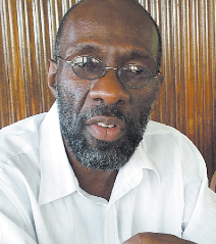President Donald Ramotar intentionally put himself in a position where he could blame his not assenting to the Local Authorities (Elections Amendment) Bill on the Guyana Elections Commission (Gecom), Commissioner Vincent Alexander has said.
On June 3, House Speaker Raphael Trotman received correspondence from the president informing him that the president withheld his assent from the bill “because Gecom has publicly declared that it is impractical to hold local government elections on or before August 1, 2014 as the bill mandates.”
The bill was passed on February 10, almost five months before the proposed deadline. The National Assembly then sent it to the president, before it was sent to the Chambers of the Attorney General (AG) Anil Nandlall, who also functions as Legal Affairs Minister. There it remained until the president made up his mind late last month. Alexander believes that the president’s tardy response to the bill is intentional, and asserts that it is an indication that he is “playing games.”

The president’s justification for not assenting to the bill mentions nothing of the people’s lack of readiness for local government elections, an explanation that continues to be floated by several Cabinet members, including acting Local Government Minis-ter Norman Whittaker.
Whittaker, since the bill was passed in February, has also argued that the polls cannot be held because Gecom is not ready. Gecom Chairman Dr Steve Surujbally, however, has said that Gecom can hold elections in as little as six months after the order is given by the local government minister. The minister, however, cannot give the order until the bill is signed by the president.
President Ramotar and his Cabinet’s seemingly reluctant approach to the issue of local government elections has prompted critics to argue that government is pessimistic about its performance at such elections—a claim government has vehemently dismissed.
Alexander says the president can give no clearer indication that he and his government are ready for local government elections than by signing the necessary legislation, thereby mandating the elections by or before August 1. If the specified deadline is not practical, Alexander reasons, Gecom is empowered, through the law, to advise government on a more practical date later this year.
This route, Alexander argues, solves several problems. First, the president will be able to dispel suspicion that his government fears the results of local government elections and is trying to stall the process by not signing the bill. Second, there will be no need for new legislation to be brought. Currently, government is in breach of the constitution as there is no existing legislation postponing local government elections for the last year.
As there is no existing legislation postponing local government elections, and considering that the president has made it clear that he will not sign the current proposed legislation, Whittaker may be required to table another amendment in the National Assembly.
“In terms of what happens next, I do not want to talk off the hat,” the minister offered, when asked. He nevertheless assured this newspaper that the issue would be addressed at a subsequent time.
When the bill was tabled earlier this year, its initial provisions called for local government elections on or before December 1, 2014. The opposition parties, however, – A Partnership for National Unity (APNU) and the Alliance for Change (AFC) – used their combined majority to amend the deadline to August 1 or a date before.
After the legislation was passed, it was sent to the president’s office for action. Nandlall, however, said that the bill did not get to the president’s desk, but instead was re-directed to his chambers for scrutiny. On March 16, Nandlall told Stabroek News it was imperative that all bills go to him because as AG he is required to give legal counsel to the president with regard to what action he should take. Despite his role as advisor, however, he argued that the bills cannot leave his office until the president advises him on whether or not he intends to sign them.
The leaders of the opposition parties have expressed their dissatisfaction with the president’s decision. APNU leader David Granger said, “all indications suggest they [government] are not anxious to have elections… the president’s refusal assent is no surprise.” He also said that the decision is unacceptable and promised that the coalition will be taking “appropriate action” in due time.
Meanwhile, AFC leader Khemraj Ramjattan believes the president is “complicating the issue. Like Alexander, Ramjattan also stated that the president can sign the bill and allow Gecom to say if the deadline is practical. If the deadline is not practical, he said, Gecom can give a more practical deadline.
Ramjattan holds the view that “he (Ramotar) does not want the election because it is a good ‘ass lickin’ he is going to get.” Local government elections, constitutionally required every three years, was last held in 1994.









